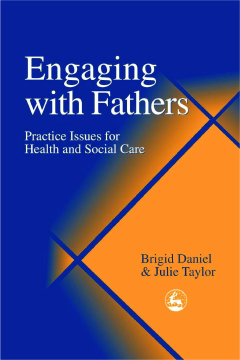
Additional Information
Book Details
Abstract
Fathers are often marginalised or ignored in child protection practice. This reflects an uncertainty within society as a whole about the role of fathers in their children's lives. Engaging with Fathers is a guide for social workers and health visitors on how to broaden their practice to include fathers and stepfathers, whether or not their behaviour is abusive or problematic. The authors' approach is based on theoretical analysis and explores attachment theory, feminism, anti-discriminatory practice and nursing ideology as they have influenced social work. From this they provide suggestions on how to assess the potential risks and the potential assets fathers may offer, and positive examples of what can be done in child care and health visiting, drawn from real practice. They set out a theoretical framework that takes account of the reality of the situations practitioners face, draw up a model for intervention, and demonstrate the implications for practice.
Engaging with Fathers is written for the busy professional and avoids jargon. Each chapter contains summaries of the main points, examples of research, exercises, key issues to consider and suggestions for further reading. While developing practice with fathers, it remains firmly focused on what is best for children.
There can be no doubt that this book has met its aim. It is an informative and highly readable book, which is full of useful ideas and practical suggestions for social work and health care professionals to draw on in their work with families. The authors bring to the book their shared experiences of nursing and social work practice. Unusually, they also introduce practice examples, this makes for a rich text, combining the depth of a single-authored text with the wider coverage of an edited collection.
European Journal of Social Work
The particular value of this book to readers lies in the discussion of child protection and the needs of fathers within a political and social context. I recommend it to all those concerned with increasing their awareness of issues relating to child protection, social issues and good, family-centred care.
Community Practitioner
Brigid Daniel is Professor of Social Work and the University of Stirling. With a background in psychology, she has practice experience in child care and protection work and is the co-author of Child Development for Child Care and Protection Workers, also published by Jessica Kingsley. Julie Taylor is Head of Strategy and Development (Abuse in High Risk Families), NSPCC, and Professor at the University of Edinburgh, UK. She has written extensively on child care and protection.
Table of Contents
| Section Title | Page | Action | Price |
|---|---|---|---|
| Engaging with Fathers | 3 | ||
| Contents | 5 | ||
| Acknowledgements | 6 | ||
| Introduction | 7 | ||
| 1 Contemporary Context | 12 | ||
| 2 Fathering Roles | 41 | ||
| 3 Attachment | 71 | ||
| 4 Anti-discrimination | 99 | ||
| 5 Caring for Fathers | 126 | ||
| 6 Fathers as Risks | 149 | ||
| 7 Fathers as Assets | 180 | ||
| 8 Framework for Practice | 211 | ||
| Appendix I Exploring and Dividing Roles: An Exercise to Use with Couples | 231 | ||
| Appendix II Fathering Roles: a Case Example | 233 | ||
| Appendix III Fathers and Infants: The Father’s Role in Infant Care | 234 | ||
| References | 235 | ||
| Subject Index | 246 | ||
| Author Index | 252 |
